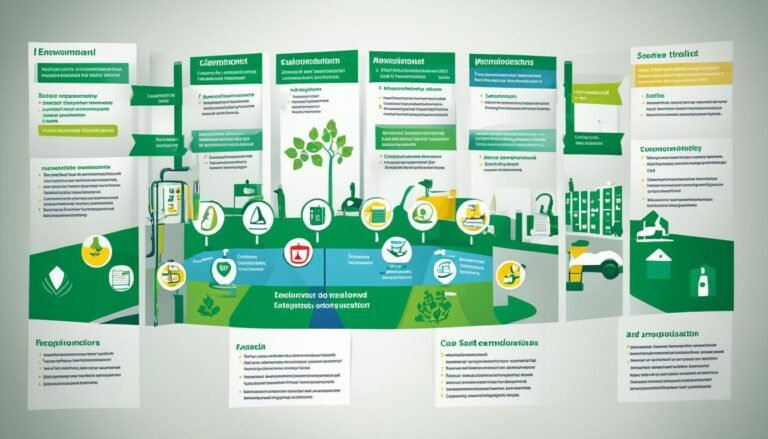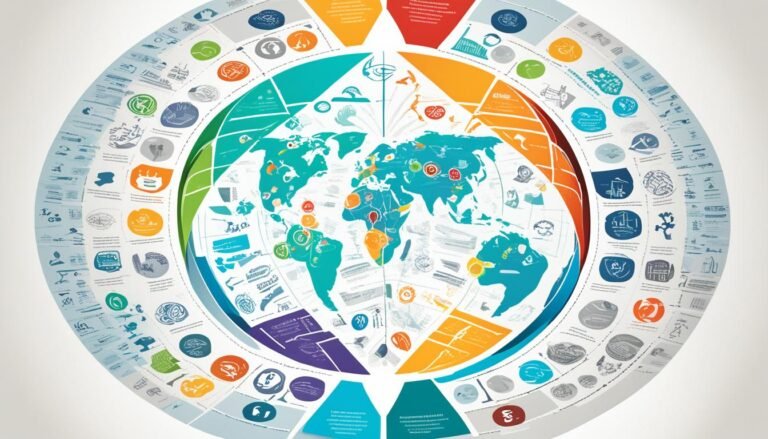Upskilling the Irish SME Workforce: A Practical Guide
How can Ireland’s small and medium enterprises (SMEs) bridge the productivity gap and thrive in an increasingly competitive market?
Many Irish firms have seen their productivity drop over the past decade. This shows how vital it is to upskill and keep learning. The gap in productivity between foreign-owned and local firms has grown a lot. This is a big challenge for the economic growth of Ireland, especially for small businesses in sectors like retail and hospitality.
Ireland’s National Skills Strategy 2025 highlights the key role of training employees to stay competitive. The goal is to build a workforce that’s ready for digital and climate changes. This guide will look at ways to improve employee skills. It aims to help local businesses grow and meet economic goals.
Key Takeaways
- Upskilling is essential for resolving the productivity gap among Irish SMEs.
- Continuous learning is pivotal for adapting to technological and economic changes.
- Ireland’s National Skills Strategy 2025 outlines the importance of workforce development.
- Employee training enhances retention and satisfaction, reducing staff turnover costs.
- Government initiatives and support are crucial for enabling comprehensive upskilling programs.
The Importance of Upskilling in the Irish SME Sector
Upskilling is key in today’s fast-changing business world. SMEs are the heart of Ireland’s economy. They need to grow and stay competitive through professional development.
Economic Impact
Upskilling SMEs has a big impact. Skillnet Ireland helped 19,000 businesses in 2020, with 85% being small or micro-enterprises. This helped 70,000 workers. They offered over 8,500 programs in areas like management and digital skills.
The World Economic Forum says skills like critical thinking are vital. SMEs need these skills to thrive in a digital and green economy.
Benefits for Businesses
Training employees helps bridge the gap with big companies. Skillnet Ireland plans to double training by 2025. They focus on digital and sustainable skills.
Upskilling in areas like AI and fintech helps SMEs innovate and stay ahead. It makes them more competitive in a fast market.
Employee Retention and Satisfaction
Upskilling keeps employees happy and loyal. When workers see chances to learn, they’re more likely to stay. Skills like teamwork and active learning are key for SMEs.
Supporting ongoing learning helps build a strong, dedicated team. It’s vital for handling digital and green challenges. Focusing on employee growth also cuts down on turnover, helping SMEs stay stable.
Upskilling brings many benefits. It boosts the economy, improves business performance, and makes employees happier. These benefits help create a strong sector ready for the future.
Challenges Facing the Irish SME Workforce
The Irish SME workforce faces many challenges that make it hard to improve their skills. With the digital world changing fast, small and medium-sized businesses in Ireland find it tough to keep up. They struggle with skill gaps, limited training resources, and the need to adapt to new technology.
Skill Gaps and Mismatches
Skill gaps are a big problem for SMEs. Half of these businesses say they can’t find people with the right skills. As technology and trends change quickly, there’s a big gap between what workers can do and what jobs need. The Continuing Vocational Training Survey by the CSO in 2017 showed that smaller companies often don’t invest much in training their staff.
Limited Resources and Training Access
Small businesses also struggle with limited training resources. By 2021, about 4,500 businesses will get support to grow and succeed. But, many still find it hard to get into good training programs. This is because they don’t know about the programs or they don’t have enough money.
The Eurostat’s 2018 report said that only about 8.3% of people in Ireland who work are taking part in lifelong learning. This is lower than the EU average. It shows that there’s a big need for better access to learning opportunities.
Adapting to Technological Changes
Adapting to new technology is another big challenge for Irish SMEs. The COVID-19 pandemic made digital skills more important than ever. Many businesses, 65%, think their staff will need to learn more about digital skills in the future.
This includes learning about new digital tools, understanding cybersecurity, and getting used to new business models that rely on technology. But, only 27% of SMEs have a good plan for developing their staff’s skills. This is much lower than the 72% of bigger companies that do.
| Challenge | Statistics |
|---|---|
| Skill Gaps and Mismatches | 50% of SMEs reported issues finding skilled employees |
| Limited Resources and Training Access | Only 8.3% participate in lifelong learning, below the EU average of 12% |
| Technological Adaptation | 65% of SMEs required digital upskilling in upcoming years |
Upskilling the Irish SME Workforce: A Practical Guide
Upskilling the Irish SME workforce is key to staying ahead in today’s economy. We’ll show you how to spot skill gaps, craft training plans, and use outside help to boost your team’s skills and growth.
Identifying Skill Needs
First, figure out what skills your business needs. The World Economic Forum says 4 in 10 workers might need new skills soon. Match these needs with your business goals and industry trends. Use skills tests and listen to your team to see where you need to improve.
Tailored Training Programs
Creating training that fits your SME’s unique needs is vital. Over 28% of employers think workers might need more than a year to get new skills. Offer training that covers both hard skills and soft skills to boost productivity and happiness at work. Look at Manpower’s programs with the University of Phoenix and Tooling U-SME for great examples.
Leveraging External Resources
Working with others can really help improve your team’s skills. Teaming up with schools and industry experts brings in new knowledge. Check out Skillnet Ireland’s focus on business-led training and the Academy of Advanced Manufacturing with Rockwell Automation. Also, connect with government programs and networks for support and funding.
| Statistic | Details |
|---|---|
| Reskilling Needs | 4 in 10 workers |
| Long-term Reskilling | 28% of employers think workers need more than one year |
| SME Employment | Accounts for over 1 million employees in Ireland |
| Cybersecurity Workforce Gap | 3.4 million additional people needed |
| Green Economy Jobs | 60 million new jobs anticipated |
Follow this guide to help your Irish SME spot skill gaps, design strong training, and use outside help. This way, you can grow sustainably and innovate.
Successful Upskilling Strategies and Case Studies
In today’s fast-changing business world, it’s key for SMEs to use upskilling strategies well. Companies like Zplus Solution IT have made these strategies a big part of their work. They’ve seen great results. Tusharkumar Patel’s Master’s Thesis, “Employee Training and Upskilling for Digital Roles for a SME Company in IT Sector,” offers a detailed plan for improving employee skills in IT roles. This thesis, with 71 pages and 14 appendices, covers how to spot upskilling needs, plan training, and see how it helps businesses.
Patel’s research includes deep interviews with important people. It shows how important it is to develop the workforce for better performance. The study talks about how to analyze training needs and use different upskilling models. It shows that a well-planned approach can bring big benefits. For example, using digital solutions and AI makes the workplace more creative and boosts project success.
This good impact isn’t just for one company. Experts say that filling skills gaps could add at least US$6.5 trillion to the world economy by 2030. Using digital and AI solutions could add up to US$5.2 trillion and cut greenhouse gas emissions. In SMEs, AI helps with things like making operations faster and making companies more competitive, showing how upskilling works well in many areas.
In healthcare, manufacturing, and finance SMEs, AI is used for things like helping with diagnoses, predicting trends, automating tasks, and catching fraud. These efforts have made things more efficient and improved the quality of services and products.
To wrap it up, using good upskilling strategies with thorough training and resources is key to staying ahead. Case studies show that investing in employee growth leads to better digital tools, more work done, and a happier, more involved workforce. SMEs looking to do well should look into these upskilling best practices for the digital era.
| Company | Sector | Strategy | Outcome |
|---|---|---|---|
| Zplus Solution IT | IT | Digital Role Training | Increased Project Success |
| Healthcare SMEs | Healthcare | AI for Diagnostics | Improved Patient Care Efficiency |
| Manufacturing SMEs | Manufacturing | AI for Production Optimization | Enhanced Product Quality Control |
| Finance SMEs | Finance | AI for Fraud Detection | Ensured Financial Stability |
Conclusion
Upskilling the Irish SME workforce is a must, not just a dream. This guide has shown how crucial continuous learning is. For Ireland’s small and medium-sized businesses, it’s key to keep up with global changes and digital shifts.
Initiatives like the National Skills Strategy 2025 and the IDA strategy for 2021-2024 highlight the need for upskilling. Most jobs in Ireland will need new skills in the next decade. This is especially true for retail and hospitality, where productivity is low.
Efforts to improve skills are vital for meeting economic goals on digitization and job quality. With more people wanting to work remotely, businesses must adapt. This includes changing how they manage and operate.
Skillnet Ireland is at the forefront, offering training and resources. They aim to increase training by focusing on digital skills and climate action. This will make upskilling a key part of work life.
SME leaders should use these resources and invest in their teams to stay ahead. In this changing world, learning continuously will open new doors. It will help Ireland grow sustainably and stay competitive globally.
Source Links
- Transforming the Irish Workplace with Learning and Development
- No title found
- Ireland – Country Reports | Ireland offers a best-practice example of workforce development for the 21st century
- Layout 1
- OECD Skills Strategy Ireland
- Why Skills Strategy is Key to Unlocking SME Growth | Xeinadin Ireland
- Invest in Your Talent, Reap the Rewards: The Connection Between Upskilling and Thriving Organizations
- Layout 1
- Case Studies: SMEs Successfully Implementing AI Solutions – Insights and Outcomes | ProfileTree








